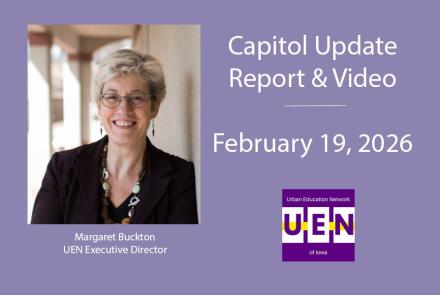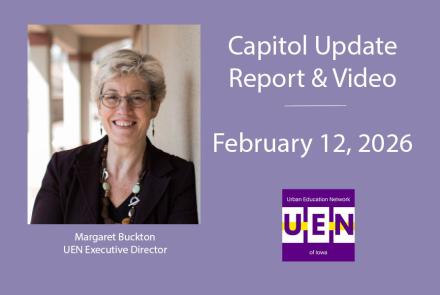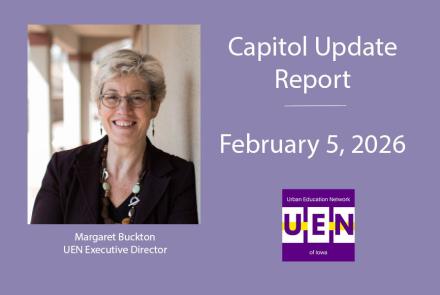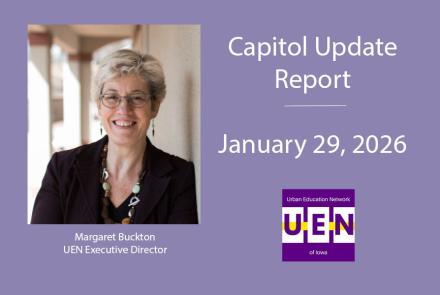Call to Action - Charter Schools to the Senate
UEN CALL TO ACTION
Charter Schools HF 813 to the Senate
March 26, 2021
Download the UEN Call to Action - Charter Schools HF 813 to the Senate
The House’s Charter School Bill, HF 813, was amended and approved on March 25th with two Republican Representatives joining the Democrats in opposition. See the March 26th RSAI Weekly Report for details of the bill and approved amendments. UEN Opposes HF 813 and shares the following concerns:
1) Transparency Public Records: The House added public meetings chapter 21 to the governing board and that’s progress. However, without the application of Chapter 22, stakeholders can't get the minutes or copies of contracts, verify bills paid, check staff credentials, get copies of curriculum or policies, determine if nepotism or conflicts of interest are possible, etc. The bill states the charter's annual report is subject to public records, but nothing else is, including the audit. The governing body is required to be a nonprofit, but they can contract with for-profit entities for everything. Without access to contracts and bills paid, there is no way to verify how much of the funding is going into instruction or leaving the state.
2) Representation and Community: The Founding group that applies directly to the state BOE for a charter without school board approval does not have to be Iowans or have ties to the community. HF 813 makes the governing board Iowans, of which at least half must be from the charter's geographic area. That's an improvement but does not go far enough. The theory of charters is that a parent group or community leaders find a need and come up with a creative alternative. The founding group should include parents or community leaders. We would prefer the founding group be required to work through the school board and eliminate the founding group model altogether.
3) Billing Fairness: Charters across the nation profit by receiving funds and not educating students. The bill should require the charter to pay back to the school any prorated amount of funding associated with the time a student is no longer in the charter school if the student returns to the public school or pay back the state if the student returns to home school or private school and the state-funded their first year in the charter.
4) Special Education Oversight: It's not clear, especially without public records, how the charter will provide for special education services, but they might provide a Cadillac version of services that exceed the standards provided by the public school and expected by the state and federal government. Since they bill back the actual costs of the services, the public school and their taxpayers are on the hook for the costs.
5) Charter Closures Are Disruptive: When charters close, students and families, staff and school districts are caught in disruptive transitions. Some of the major findings of a study reviewing charter schools, reported in the Washington Post https://www.washingtonpost.com/education/2020/08/06/new-report-finds-high-closure-rates-charter-schools-over-time/ last August, that opened between 1998 and 2017:
- 18% had closed within 3 years of opening;
- 25% closed with 5 years;
- 40% closed within 10 years;
- Only 5 of 77 groups of charters were still open after 15 years.
6) Student Outcomes: "Do they raise achievement?" The National Conference of State Legislatures said this, "The most rigorous studies conducted to date have found that charter schools are not, on average, better or worse in student performance than the traditional public school counterparts." They went on to say, "A well-publicized study of charter schools by the Center for Research on Education Outcomes (CREDO) in 15 states and the District of Columbia studied 70% of the students enrolled in charter schools in the U.S. They found 17 percent of charters posted academic gains that were significantly better than traditional public schools, 37 percent of charter schools were significantly worse, and 46 percent were statistically indistinguishable. Another recent study by Zimmer et al. found that charters in five jurisdictions were performing the same as traditional public schools, while charter schools in two other jurisdictions were performing worse."
UEN opposes Charter School chartered by an outside entity:
- School Flexibility: School boards should be in charge of any charter schools in their communities. Provisions of HF 813 expanding flexibility for Public Charter schools are only good if those flexibilities, oversight and authority to charter remain with the locally elected school board. We should expand Iowa’s existing charter school law to give that flexibility to school boards. The second chartering method, to allow outside entities to create charter schools without the school board’s authority or consent, is not good for Iowa.
- Public Oversight: taxpayer dollars should be overseen by locally elected public officials like school boards. We don’t need an “education management organization” with no Iowa connections telling Iowans what is best for our students.
- We already have a public school charter law in Iowa.
- Districts are already providing innovative, personalized instructional opportunities to help our students be successful in the 21st century and beyond and parents have many school choice options available.
- Share what your district does that helps your students prepare for the future such as:
• Innovative program offerings
• Personalized instruction opportunities
• Concurrent enrollment opportunities
• Career or technical academies
• Collaborations with local businesses or apprenticeship programs
ISFIS summarized a report, Review of Separating Fact & Fiction, by Mary Miron, Western Michigan University, and William Mathis and Kevin Welner, University of Colorado, Boulder, February 2015. Find the ISFIS Summary for additional thoughts to share or dig deeper into the experiences of charters nationally.
|
To call and leave a message at the statehouse during Session, the Senate switchboard operator number is 515.281.3371. You can ask if they are available, leave a message for them to call you back, or leave a short message to “oppose the Founding Group Charter Model in HF 813.” Legislators are typically back home over the weekend. |
The following links will take you to each Senator’s legislative page, with email address and often home or cell phone number so you can easily connect with them. Continue to contact Senators, especially Senate Republicans, asking for a NO vote on the Founding Group Charter Model. Let us know what responses you get back. Remember to be respectful and explain the impact these provisions would have on students and your school.
|
Senate Republican Name and Link to Info |
County of Residence |
Email address |
|
Mitchell |
||
|
Woodbury |
||
|
Dallas |
||
|
Mills |
||
|
Scott |
||
|
Pottawattamie |
||
|
Jefferson |
||
|
Iowa |
||
|
Marshall |
||
|
Warren |
||
|
Des Moines |
||
|
Webster |
||
|
Hancock |
||
|
Buchanan |
||
|
Winneshiek |
||
|
Dubuque |
||
|
Webster |
||
|
Muscatine |
||
|
Polk |
||
|
Lee |
||
|
Mahaska |
||
|
Crawford |
||
|
Adams |
||
|
Wayne |
||
|
Scott |
||
|
Hardin |
||
|
Sioux |
||
|
Dickinson |
||
|
Polk |
||
|
Carroll |
||
|
Polk |
||
|
Delaware |
||
|
Mitchell |
||
|
Woodbury |
||
|
Dallas |
||
|
Mills |
||
|
Scott |
||
|
Pottawattamie |
||
|
Jefferson |
||
|
Iowa |
||
|
Marshall |
||
|
Warren |
||
|
Des Moines |
||
|
Webster |
||
|
Hancock |
||
|
Buchanan |
||
|
Winneshiek |
||
|
Dubuque |
||
|
Webster |
||
|
Muscatine |
||
|
Polk |
||
|
Lee |
||
|
Mahaska |
||
|
Crawford |
||
|
Adams |
||
|
Wayne |
||
|
Scott |
||
|
Hardin |
||
|
Sioux |







